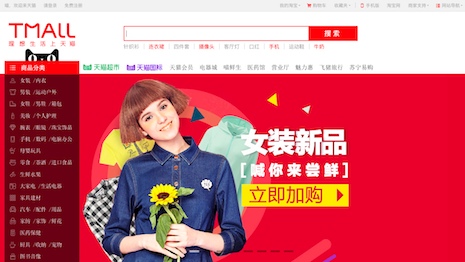By Jeff Unze
China ecommerce continued its strong growth in 2018, remaining the top luxury market in the world. To keep pace with the rapid expansion, China has unveiled a new set of laws for 2019 designed to protect consumers and encourage transparency.
The new laws will impact large ecommerce platforms such as Tmall, as well as retailers and brands.
However, the greatest impact will be to the luxury market and the way it affects cross-border ecommerce, specifically, the small to midsize resellers known as “Daigou.” The result could be short-term sales losses in the hundreds of millions of dollars.
Shape up ...
Resellers known as Daigou exist because China shoppers like to buy from international sites directly to ensure authenticity, find products unavailable in China and enjoy lower international prices.
Daigou operations buy products at outlet malls in the United States or international Web sites and sell them on Chinese ecommerce platforms. The sale appears to be U.S. or European, but is quickly shipped to China via freight forwarders skilled at avoiding duties.
The new ecommerce law closes many of the loopholes that Daigou exploits. Speculation is that up to 70 percent of Daigou will stop selling rather than adapt. The result will show up as a drop in retailers’ or brands’ U.S. or European divisions where the sales occur and not in their China divisions.
The provisions that hurt Daigou involve compliance and authenticity.
Starting Jan. 1, all companies selling online goods in China have been forced to have a China entity, pay taxes, provide customer service and have a compliant return policy. The vast majority of Daigou currently do not offer customer service, pay taxes or accept returns. In addition, registration of a China entity is a slow, lengthy process.
The new law also addresses authenticity – a major China ecommerce pain point.
In the past, companies selling fake or low-quality goods online faced fines and shutdowns. This led to a whack-a-mole game of bad actors that would sell fake goods, get caught, change their name and pop up as a new entity a month later.
This year, ecommerce platforms will share liability, along with merchants, for the fake or low-quality goods sold on their applications and sites.
Platforms such as Taobao, Weibo and even WeChat will now have to carefully vet their merchant partners or risk stiff governmental fines.
Since resellers lack clear relationships with brands, as well as proof of product authenticity, they will effectively be blocked by the extra scrutiny with no place to market their products in China.
... or ship out
Depending on the luxury brand, between 10 percent and 90 percent of ecommerce sales in China come from unauthorized Daigou channels. Many marketers have no idea how much of their product is being sold in the gray market.
To avoid a first-quarter surprise, marketers should do a quick start-of-year audit to determine their exposure. A good proxy is to check Taobao activity (reseller) versus Tmall activity (official channel).
Another method is to cross-reference shoppers from deal and cash-back sites with home addresses in prime Daigou locations such as Los Angeles, Oregon and Delaware.
The short-term winners of the new law will be official channels that are already in compliance. The China government is also making shipping channels used by official platforms more attractive for shoppers.
The official prepaid duty shipping channel – known as BC – will raise its purchase limit from 2,000 to 5,000 RMB. The higher purchase limit will allow shoppers to use the popular channel for luxury products up to $700 for the first time.
The postal shipping route preferred by Daigou, which allows them to largely avoid customs rates, will become more expensive.
China is also increasing the check rate from 1-2 percent to 20-30 percent, eroding the cost advantage of the channel.
ON BALANCE, the new law should be a great boon to both consumers and international companies. It is the first significant step to fight fake goods and it will drive many of the worst gray-market actors out of business.
Luxury brands that have not policed their gray market activity will face a steep short-term decline in their sales numbers.
Moving business from Daigou resellers to transparent channels will provide the data needed to make better decisions on product inventory, advertising and product design. This will also allow luxury providers to better control and manage their brand presentations and reputations.
The law may seem daunting or hurt in the short term, but it will put luxury brands that choose the right ecommerce platforms in a much stronger position moving forward.
 Jeff Unze is president of strategic partnerships at BorderX Lab
Jeff Unze is president of strategic partnerships at BorderX Lab
Jeff Unze is president of strategic partnerships at BorderX Lab, Sunnyvale, CA. Reach him at [email protected].
{"ct":"fhixMu1V0Dcw680ei3nDSAwxFVyMTlZgnWBSE4v0jS2sSb898N27szwyO1ndeZVmYlzbsM5cZtGnS9ZRO1oO39FOjT+j05fa45J37nXPy0zy7XWiXrg2K\/Bm47WdLe7NVXrjoKzr101fmUcZtBRIDMA+GoWUgt0t\/m0oBmk3LEOz5U+NIx0eobN3vCYG\/4Sw8CMbEacElLYQfy81YTpMv2Dpv6Lycpd6jbRYWsauwHEIfYZroi1VjUelPLw8mChubwl5+VU9\/ixAhIzhS7KGI4hAHSA3EPDSR6Mnj8mMYGGf4XAzjCzXGqUft4X59LWUv646vCt1fBNULl\/H\/0ARhAUV\/2AUaGCg0a9IOQkvXNuR5TC1SlgAWFyNU5HyVoGSTQmjm6tr6FH\/oDUx6G31HVxLf56jfFO+8axtOooqo6UrYj1gJDBwWuwR6wGBs9OH70l7h9aIV\/IkAhST5X\/TDmkCCvZezrgsfFb32EVwFysCYcahFlNZ2xcuN0h1JYp5GMQQatOg2JA\/wMVCVQIngYd\/WBRdjrzPTBJXK+zqXBFWXvd\/qdSKwyjuPY9rgX+lFnpjV2HqDZs1XGU4AZIzufDPJcJ6J5zL9B2res3NaRyKXdYSaj9uy7LCjNgxCd0pRkQq7tbWA7MuOXF84CH4QZ8zieRuI8Us1MgZpUrpSnj5sqKDZbBp5KpjsYWyCpgMiHfj8bzVWVX9XyJjZb9tSlRt\/V5RT0O5jmUNo6PeaMtOxNS2Te\/iX61jP4ZY1GgmACoupXBdJxwo6Y4oHkYrNYzMC5qE6FBmq2SC1AsEI3B75PbV1d+ghXaDwEOPbYTFOtDgL6D\/n8FebjY0adwBYMl5KStOBlnh1SlYX7IBD\/pFnTusoruuc5qp+G+Mj3Sl0x+uLmT5FblVEyboeY9Hy8hyFnZuvlivXkXPgCbztm5ck4G5C399E+UtbCUySQbpupC3+DMXKPkNcod17q2qfui2Kxs7MAc2Ax5qKP4A4XWePKVvbuTMHasifabyo\/2Bib7l64qh1sl5\/p2Tk+XVamDE\/sZ8+Lf14GeJMjgwsiZAv8gT03Fdse0HQYm3JyETL6V9yCDUGQh5rKTVXM01IJY56KSO7nXC7BtkM8Vk7KdeQZtrzlXB3q0MlVgCLkuwk3OkFmq3eTsF3AmkeZcyYAuF6v\/tJqojTAwRae9r0xwSuAOJEZcQtcay6f3xVq5x1LBQeAg7g1Pu5HmfGovU2KdjZ\/DDW1XQaXfhYPlnh\/nXmfQ53WtDgjbfvK4JuUZHPECOQDP79cDhRYnkyAfxJCUuTXkobjhS9ZcXf8JOC+edkJpFhp6ra8mn7oETAnceLmQ6KiQIsIrWwsVGiYwxskyj\/8SYp4ZVidWR6C4QMz6O72Df2ALWmXaP+fNg6ewIChZAuwGmlUDxbsT8GBD1kTd\/869dXxOo6\/EHssy5VAZVj0VjDq9sqwU\/6NFJglyoXMTU1KXBN630SVoz97gC7d5DXQ2YI6gwWT8T7YrlpAFn6dgIWydZ+CjNx2vM0CK3VOP+IMwZZFOeXSAJAbrzL3Dees3TzsLwgGGXCC+wmEu4FzCd0BBH9oF24J4sCzOxv3FlrV95hJCfPQYjGZbRweaVMs7dfXC\/RyALjfH4HfeoDuw0lttUtnkpFDF9dR64NYdfN501T1re9ke8++cjTJzkajUKOiPb0ua32KkfSbPgB+b0+U9zRKdnzYBkVFqgPmFhLgt43j2InWEvgxgB6XuRD+fealw08www\/WHgekmwpnK1ALwoHpnKgHypdsIyd\/9MWkyZys+mtFJxJLxFK1CaOTBZwcrcYoFCVGx5st1V30mnNR77PV34RpfkmBaDnrmQ\/KcwtFPXZJ7yMHQPAcKzlcmB5YyBqFAsdpd6leJOs5MlwwW1lKerAUIVCdPFIXqeX9KRyM+bHtaEGdwrQ9Y6XbUulhkOgdIcs0N7MBCwZ6bLq+WCEOjswSIJKW35HrWuXZQp9Wu4svcuKnR7+6fKPOVb\/MV1sRjbllTbDfD7JUFuGRDVehqvDzYFqaKRgBUw+WDFMasc9HHmUbvJsZDK4FEX+d+uTuOVXFAfiaj1afeyHnlxTZy3OyPGa1oQNeAFmTqKXHLOeC\/ylfE5chMO+vlf9PhYYTj3tL1YxsFC+W9DJn1+SZKa+S4HYKD8Gqu+7hlG\/OoA6ESYOBstjQqvwOQVZpv0eulag4Sy\/eFhU8yRrbuOMgNZjjqrdjFcTicxNzckKcw5+IOgWMiVUVpEZLagSkc\/Iw4UE2\/A83v5sweLbp5f4gpux6LQRPxybtHcvTMaolzMEqFSCW4wzZ0cliHLD4Gz3ywpA4xRVpIaEFW6I0sU1JSTBjo\/DKxDDrMENUNzjAN2vdCPZQp9TSCLj\/IxULKgWrObsdd8wngyW+zrBMnXA+1X00y40qNC5lehlM+hwwaPO\/EkevFLJqvE+MQyxWizgM329O87zLWDc4ebq3R3rH6JIYG2mDzNsjF1BBdc0A0yiZxGlr1BVrn\/QIx8wAVYahoVS56uOmTrBFID1HpJbQW5X\/W+oZhzjoJTv23hFFc3rhsCWYOQNvAbcIEZ6oap1wIvs+akd54xg\/wSv9SZzwx1ZYZb1ucqWjMXwOjmuy\/cVaOurrp0SvXnRG7UX1t\/+5nT0BlQR8Uhyq67jTkdw3uPSbRZbJ8YSYM13sps2JD8YsQgh0RUWjKz0w+VZ1wBSp6C38VsCgNQMHj\/iN81YdkFh0se25yUO+L1bKnkYE7rm11JVqoetSmBwq+0iqYDnRl4co3So8CiLWjaHQZCqrY\/j9C0cVwjReX0DHoOKHaBFWl8CZdulj7\/PpP1hsXM5alvc\/hABaVCIlyFFbcrSCg0dr0btBoW6E2QfDVUKXKjqjq6T3aQH6+iTHHrjlr7SoqrSy9jZr8f2xTqJQzALtQ+EyNvL2KOlGac7LEQ+2cK0fkRNN5jGCuhBcwm2Agbp\/iWNDbGRCWDU2fkD+wmt5AePv1w5F0yhhIT6v0Y3nIUmrKXuFo2BoqrZOol8Z0T5XAOvN9iQAbZX18y82b58lFmrPXEqrDNLX\/sHpKX0nSOczV5Nv02CqiMN9vRMFfmZHRYXXT0\/uCSnPx\/yH\/gDm2u5VUtgclS\/TWs3k2AkKqkdzS9e5\/uNSENAxEGmXnl3L+4wcGEBV68lvbiTbsuRYft5WmgA0knsbT9MxL4eC7XzS\/QcJo\/T45RqWZbRrq+r9uMuGXuUdjUJEv1Xp7gTXf4tMUnn9j8J+qfO5Ijzx1fI0DgTGrQSEXMyGiCOcWuH3kiDXwnkaG5jaVqKCJBVmOxOxk3i\/o32Paz82mYLVhkKXdUpUQ7FvDHnUE0KiObyEEOX\/dJ7DehO8DD1JM4lK0lhLYbhePMdr3fXyyp3bqeF\/NE\/v7jTD5uJWwyZkSH\/3koafs3rHNxwKM1hUQFvw2lyVE5vHsQRkxSxsSoQeTZ7ayaMFGYw3TtveJ+OmFh+hGvyMJZB2ZNh0kGRMRdOxyaqMv51yC8bf2ngxFsOQFstIyQxsDjRXn3hTTMya849A2\/8tf91ylzxv\/RlYoHrdkShlhYyRLAP7S+QMDbKZnfWeCyJnhOtgskjvlyp7MF7fp\/l0rKmviZ6yRShbTGEMACUfIHSZxCvDz5GsG\/bCxRzAjosueMRwph3lN8qQpn5z\/imRh5bipoI5yOR49aIq89pzBSocoYYWF5x\/v\/SvMSxNsaaFYhxf+vhLfpAtoV6ooXqA\/iH8IryBlnlsSsI6NU8o28vIskLtC1GeFv3q1pcewO8PzrSge8qV70jt1FgyeuvSUMbTBcUEFLKDDOHx7fYZorAsNRdt+RCG1erCNGx+3gnwHpHHGxDcfo2FNYDPSQE\/8LWYZFG00m5jBMYV0JtnAML3URpQAW6TRMjv0ynyABQwFsdPlFSfZiR3GXOItZbY1Bn1YhcRoVM6MBP6C50qkvd5Rfa1fTYhO4hsp2FW8O\/PYA4pSYuNuCbZqp2lf9WWJmM7+6zkDb0\/jYAvL5JVH+jUt8WEx50SOUhRPGLlX1VeFeJwoOnq3CNB56eE6OlkueTXvsRbxghVEE6D4Hjplr7SAvC39arP8e1nu3tFUrgopb\/rjy85IGJd4mb5NBkps+zhtUTX3FhOgs7Ep\/AwzDklAvGIm0Lc7zoo2W\/C0UiV1AcheM35olIkAPcdUZyYy6+H9UhxtiBDhKid0CK2cMbOT77ln07AMDwlrfAznJKMaNBq1mPHcc5e0JsnjFr1zhKfH\/LKMfryKj5\/fPrOKsURreIdeUjtPd2t3Ujl0YF0JuE4H6wpuuEDOKBzCwqfozMC0JpyVFlAotX32rV2vWISJGlmT8PRO4QJJWzbNeK3PutI5StAzZtT5A\/JNbm6I\/yVgc25pipI+\/FTI4tAk9rWjJmMikntbv60cQY\/NYNRoPyZuTqgTvvXEQnhZX\/5\/ITphpMXEl4D0B3yWVdbS8SVMn8nUZD+tnY0xWTNjrmMjqJNp0noVD+wjAdYhlyTiMbJ09D8Fat0NIG\/LIl4oiiQaAoE2PUWJSrczrJkCrO89kfE2hn3iG86YN1H6+IzFWDB5GuULdryvPnBXr7N5SjEoA76\/GX4KIQU9bCXKYW3tuwcdKywrGEu7C2Bi6vP+EuJ7yd41Ww+lZokY5+lovpuA\/QW6cCE2JL0ow15LKde\/VXIiOI\/mNvhl+5Z4ClkK6xTNtFU4mxm7AB0O\/B5Kj4G98fyZ6NaKiEIzKY0Pyj7\/hKzDLN+4Df9UJfF93cZaok3SRBSgU6yUsYto7AU0VoflfcsUHA+SkMgOlmrgxk4nq\/my8hIBcKZ0qcXA+sfU48np\/drhCzIs+lnu\/lTlutbpozvKfHrxBYSa5GA+NlNlcGCjClFdnDZVmwAz6kP0hMnZXNiyYKcb+WKDzSNk9fDAPxmqyTawmolTUPVSeaxTlWbvZ2MvYgzK7RPQFvgGhNuJB7ue9iijFd1CMuWs5NX\/vX2\/BE9kScOehZdM5kTezqKfmfWK2IvySB0k3YiIOoBukNSrqDk6vayh2ZVPEQvTrAYnpYzOB4n3VYXGzrPyGwc3ZCM26ru7YZeQJYNdq4rGT4+QNdieL5AUVHEebuRMHebWhFJG1\/weprRdzh70Tz393pf2qZBvtoK9gCLOCzi0hQLaRLnK5K4I2P10wZAQdYIRRxKtkXepnrPeaMao6XmFp0kcHpVLnaBXSdOtXsDVYXBT0MvztgeiQyz9FmMIaUfXpW1rbjD0YiAEtIpRfSIiplPuM69PoCXLPSPcSJWbaT7\/14OkGlgz7gihN2h582m3jBe5z6haLtKol3i92t9MZNScnU+ndOZhpRZAr6CnF4QPLHesooaJs8l41gL51VqmtcC+W7836OU40bsIGtUBpLGZ1CybTM6Mkl4zrf4CqXUhNshmV58P6yuGLz59vmSTRWlQzxFRBSzA78Mh+9FraSYDcElYAsTV0LbeeBarxD9bLEnHAw2BbI7dTMmLNJ4O\/SgehQGhc1K4\/e0x4SxIh6pQaKiBpQzbcxBpt2xSQ+D026x4j4H9vwLvbfPKNUrzfYsNdQUNruYf6AxyiWiPltLBbg2dvJrSOzLzlNOmQ8tW+uUCZmbkPJ9HgT5itUU\/iIXRj+f\/FM9e\/7QOhhsU58wzjm7xqF1QeN3tvQ877dJI998KoXVOgxqhpdoCvtxobinO3W6GW\/VsnCSx\/Qt7runvsvpdocZx5Pr9gSQhSTzOn1GUMkrOjTRZ\/jng++vlkgNKUVMJ2FSKFctFFo4Y1V3KeKI+Lbd6\/XNEY4WRlqdWH8MQqOUvqFEso31rOzEtyK8M\/MQroeHRFPVZ14tRy63GwDN\/ABpOU5c0faA8giVNPkfA\/NHgaubSSsVtBMm\/eYkIU1OISjIIWPoL0kYzl2I5F1P6LhdVGZHHKPEWATJiLWU8xOMwnYfeSxj62cTI\/kABZiG6QKF0CV2iEYNTnSLb6G2dVcQTNT75nkh3pUc9xFlmhnd6dI274ulNHUvMeh\/CJowCPiD8\/+4s642u5Zl26rzGcBlgeqfwobjkaugIftIqqBiL7+h1E\/8KjeYgUAIfd+uPDpToJth+cQf2bRMPl7tA4ccLpxQQU12+gxMvZuTyKG2Z8E\/SMM8G5bmvTfgTutw4n7mJ66Ca+jnbE8Dvas2q2M863QZpeJLk+UbKRnuWKOvd61FJmzlYp4g0RcRKm8OurKjDEfjF0vUMjC\/AKxWQQ1m\/tUJyNIChpvvYLhYeN7YRVzIDJsuVo4dCCG4L3ruX+sl2tBDJ7rFBW0mcAZfQsFu\/cFpS4Z3G8AkFUfWSv+NbZe9DQHfCrG4wOAiwBoUK\/tJRSgf5nOefvMLXc+9gRD7+B0hiXfHITiEb+CSpJ9sfGXKGe2pXofHVrFWjLKAeXx4zNusdaWl1ascifYblePj+MvkQoPyE73wtMeyhNf2nqsZY9Xr+Z6dvIhwU5ghh3LN8SdTrkxTKQi0jTq1MvbZboYXvABRoCAbHSX6ihJnRpXjdWTfM1UKnu\/vh9jXFMpv9CHcCwAy8uxQ7Wh67LqBOJZrKU9ddrMgUPAScglxAS\/uFxUgZFtXVcV13BMRwH3BgCs644f1o9oVa0esJ76uwCoqsE1cuQPKXAGMaKZKfFnJkAmZGJ6bJH1EC16BmAcBlSLrOeHYICU0zGpvWzUcjazSrU2smOaGtIUQEf9bBL4oQwn7Ntm5YkeeNuqqYc+bPajbBejQv57Q2GXP0sLcoX612vkpNQs7kGZ6\/N6e3hSdgiTOOAgtA7rGyPE\/L7BYti9B7duVmdR\/W4srCLrKAVnO+I9vsdBcb4xfa9MTnEhEIhv\/KdRA1D5RGmQWJrTnHnhi8r2JxxD0bilrbxnZrnN0PkvVewN0pFmfgLMglmYhwh40YEY6duRSFGYLTjFfBFVzJvnd4cAGKPJcVHhttk\/ZSUyYObMPiQ+50nFI5koa22N6VCr4729UNx6mn58Se1nSCj863qafQCtXjj\/3P9wAfILNyWeohg0WZeYBsF1fs+ThqVj37bIWc2aL1+fDSCVKM5heZunEbN69mYAL7JHToJ1vpVnKXy07ffayzGqS2AgA2OFiN0nL2ArWwsZ1w51ZSaeMvl0fD8AUSlI0P5M8j+xC5WcgWVUE4Yk83MDEbXc5oraJTVv6G14ZHd9mICfUTa2ekEBsOMhHZCXIop+wSwMZxxW7zFcpTNoBLprqV+BB9ZI0b05R4SOlkq\/ypwDi4RAZZSURl29PaAV3C8bq\/XbprCqdK4NRnpLgeS22hRq\/c7lD\/2Lh9bjBvH4qR8PMetdk3DgTmUe9+GW8FbFNsuCZ\/+JyZSYElvvVGNqSzRmyu9QN3oKWgqPRi6KJKP6TC4idX0LuxFybDTwbZQ79XYcHYiF8NFh+78OAdrseclGJbsRWoqhUcyaWDow+OX+7MalW\/2d5B7MLM8o+pTiSgQKiuqJGUYBzYp3WMvL6ATPygMwNQkQDGGufjYBohGGf9thEbIahp6QH5oL3OijC7pQFAA6vM7ms89vqx5lOC20CJ6LSx29q+g6EQZvi3LE+jAehxlYJGUcv0ArDAiS3zwxRqgeXBvAcw2+acdEm21bkeR7s0\/DYBJ0WqaG6Wi9FhXdoAOgOPGGH8Il8Qfgt4XsQdChBfS\/p1jJWacIIJcHR8BV+W3UwhqfprUDT5wfIJN8x3QTKodIi2I9dVWHm3Um7dqVWAaqTYVvW3FPfsI7JBUBxQ4BewRYSJQxi5Sh7c2Rw==","iv":"39718a7dfb9d03586fb6e6b850333edc","s":"34c3a181df38e340"}

 Tmall, one of the leading ecommerce platforms in China, has implemented strict compliance policies to weed out listings and sales of fake luxury goods. Image credit: Tmall
Tmall, one of the leading ecommerce platforms in China, has implemented strict compliance policies to weed out listings and sales of fake luxury goods. Image credit: Tmall
 Jeff Unze is president of strategic partnerships at BorderX Lab
Jeff Unze is president of strategic partnerships at BorderX Lab